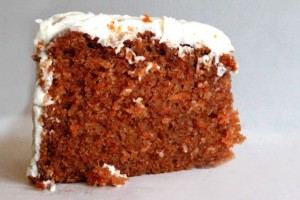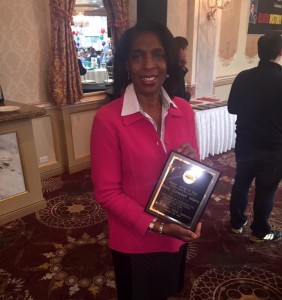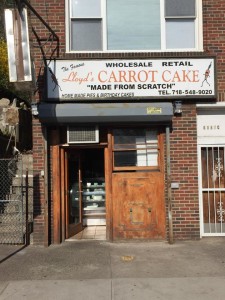
Like so many things in our fast paced society the art of cake baking in America, dating back to the 1930’s, has been simplified. Yet there still exists an appreciation for the “made from scratch” version produced with mom’s tender loving hands. More often than not, however, our mother’s recipes are adaptations of their mothers. Those in turn are eventually bequeathed to the next generation. This is the secret to success of Lloyd’s Carrot Cake bakery in Bronx, New York. Founded by Lloyd Adams in 1986 their desserts have become wildly successful because of a recipe for carrot cake Mr. Adams inherited from his grandmother. In a country that invented the “add water and stir” cake mixes, Lloyd’s variety is a refreshing reprieve for Americans to satisfy their sweet tooth with something genuine.
Medieval Origins
Carrot cake has been around since the early nineteenth century but its origin is often traced back to the Middle Ages. During that time sugar and other sweeteners were hard to come by, so Europeans opted for the orange vegetable as a substitute to make carrot pudding. Someone—perhaps a grandmother—had the idea of placing the pudding into an oven. The baked product came to be known as a carrot cake.
The oldest known recipe dates from 1892 to the tiny village of Kaiseraugst in Switzerland where it was very popular, especially for children’s birthday parties.[1] Baking would eventually go through profound changes.
Cooking Is “an Act of Love”

In large part, the transformation in cake making can be attributed to Pittsburgh native John D. Duff. In 1930 he patented[2] an idea of what would come to be known as “Cake Mix.” Mr. Duff’s recipe for pastry products was simple. Provide all the ingredients—flour, molasses, eggs, and such—in a dehydrated form and leave the cook with a simple task: add water, stir and bake. American “grandmas,” along with their unique recipes, were thus proverbially thrown under the bus.
Many women, however, rejected the novelty outright. They did so, according to psychologist Ernest Dichter, because most women saw cooking as “an act of love.” The “simplicity of the mixes,” he discovered, “made women feel self-indulgent. In order to enjoy the emotional rewards of presenting a homemade cake,” he concluded, “they had to be persuaded that they really baked it.”[3] This is likely what led Mr. Duff to modify his original patent with one that addressed the “psychological handicap involved in the use of dried or powdered eggs.” He thus changed his original add water and stir patent to also include “the use of fresh eggs.”[4]
Capitalizing on this idea, hundreds of American companies such as Pillsbury, General Mills and Duncan Hines began producing “cake mixes.” Betty Crocker paid heed to Dr. Dichter’s discovery and gave women the sense of satisfaction they desired by allowing them to add fresh eggs to the water. “Those eggs keep it moist and tender to the last crumb,” said one suggestive commercial of the 1950s, “not that you’ll ever have any crumbs!”[5]
Since then box mixes, with and without real eggs, became ubiquitous in supermarkets nationwide and restaurants frequently serve such varieties to their patrons. All the while Americans were left to imagine what grandma might serve. Lloyd Adams never had that problem. He savored his grandmother’s cake—the carrot version—as a boy and with a good idea he has earned fans around the world.
Cultivating a Tradition

Lloyd Adams was a social worker before he began baking in his Harlem apartment in the early 1980s. True to tradition, the harmonious continuation of the past, he tweaked his grandmother’s carrot cake recipe until he got it the way he wanted it. At that time he was a one man show selling his cake to coffee shops, a loyal fan base and a dozen wholesale customers.[6]
When he told his future bride, Betty Campbell, that he wanted to be a baker she recoiled. It did not seem a profitable way to make a living and support a family. His business strategy however was simple. “You have to get them to taste it. Once they taste it we’re in [business].”[7]
[like url=https://www.facebook.com/ReturnToOrder.org]
They eventually married and opened a small kitchen in the basement of her father’s East Harlem apartment but quickly outgrew it. In April 1986 they opened their first shop in the Riverdale section of the Bronx. It wasn’t long before they had a faithful clientele. Their menu would later include such delicacies as pies, muffins and red velvet cake. It was the otherworldly carrot cake, however, which kept customers coming back in droves. Lines have been known to stretch for a city block and if you are going to stop by for Thanksgiving dessert it might take three hours to be served.
“The Carrot Cake Lady”
In February of 2007 Lloyd died suddenly of a heart attack. Hundreds attended his funeral and praised his contribution to their community. For six weeks the Riverdale store remained closed leaving mournful customers to fear it would not re-open. One patron, from far away Florida, left a note on the shuttered doors expressing his disappointment.

Much to her patron’s relief the bakery did not close, they were merely renovating. Mrs. Adams was determined not to let her husband’s dream die with him. Six weeks later the bakery was reopened and began churning out, “70 cakes a day, using over 600 pounds of carrots and 200 pounds of cream cheese for the frosting.”[8] These ingredients are actually the secret to Lloyd’s success. Their specialty cake is not just carrot in name only. Copious amounts of the vegetable go into each one, and the mouthwatering icing is made with real cream cheese not a hydrated variant.
Since then Mrs. Adams, who eventually earned the moniker “The Carrot Cake Lady,” opened up a new location in East Harlem which serves over 400 cakes a week. One can only imagine her surprise to find out that one of them found its way to a soldier stationed in Iraq, courtesy of his friends in the New York City Fire Department. On another occasion a visitor from the Philippines carried one home to her mother. This led Mrs. Adams to consider putting up a map to chart the distant journeys her cakes have made. A good idea when one considers her husband’s culinary masterpiece has made its ways to China, Ecuador, Israel, London, Nigeria and eventually Costa Rica, where “The Carrot Cake Lady” was born.[9]
Fans of Lloyd’s can take consolation in the fact that the dream started by Mr. Adams and kept alive by “The Carrot Cake Lady” will continue. Their daughter Lilka, uses her marketing skills to run the bakery’s social media operations, while son Brandon is currently the store’s general manager.
“Changing the World”
 In our industrialized world which has affected everything, including cake baking, one cannot help but breathe a sigh of relief to know there is an alternative to Betty Crocker. Thanks to a New Yorker who felt his recipe could make it big, Americans can enjoy a handcrafted version right at home.
In our industrialized world which has affected everything, including cake baking, one cannot help but breathe a sigh of relief to know there is an alternative to Betty Crocker. Thanks to a New Yorker who felt his recipe could make it big, Americans can enjoy a handcrafted version right at home.
“I’ve always had the social-science view that I could change the world,” Mr. Adams once said. He admitted the joy it brings, “to walk into a restaurant where a customer is eating a slice of cake and hear, ‘Wow, who made this carrot cake?’”[10] He might not have changed the world but his cakes have most certainly traveled a good part of it. In a country commonly known for “cake mix,” the popularity of Lloyd’s “made from scratch” creations, both here and abroad, is but one more example of a paradox that exists only in America.
As seen on tfp.org


